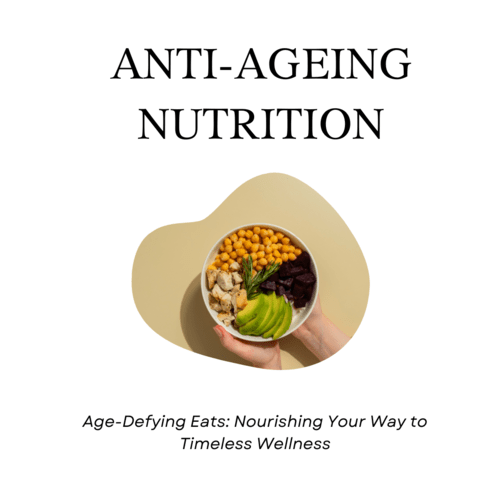Ageing, diet, and physical activity are three pillars that profoundly influence your journey through life. Have you ever wondered about the mysteries of ageing? It’s a process we all go through, yet it still holds many secrets. Today, let’s explore the significance of ageing and how optimising your diet and physical activity can enhance the quality of those added years.
Picture this: you’re celebrating your 74th birthday, and you realize that, according to the World Health Organization, you’ve got around 10 more years of life ahead of you. That’s a comforting thought, but here’s the catch – it’s not just about how many years you live; it’s about how well you live them.
Ageing is perfectly normal, a natural journey our bodies undertake as time goes by. But it’s not all sunshine and rainbows. Our bodies undergo wear and tear, and there are certain changes we can expect. For instance, as we age, our muscles tend to shrink, our bones become less dense, and even our immune system takes a bit of a hit.
But that’s not all. Ever noticed how your grandma’s favourite dishes don’t taste as flavourful as they used to? Or how grandpa seems to forget to drink enough water? Well, that’s ageing at work too. Our senses, like taste and smell, gradually fade, leading to a loss of appetite, while our kidneys may not function as efficiently, putting us at risk of dehydration.
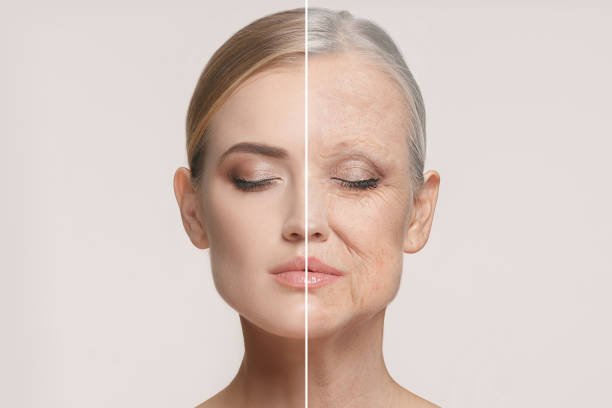
And let’s talk about our digestive system. As we age, it doesn’t work as efficiently as it once did, meaning we might not absorb all the nutrients our bodies need from our food. So, what’s the deal? Are we doomed to a less vibrant life as we get older?
Not quite. While our genes play a role in how we age, recent studies suggest that factors like stress, diet, environment, and physical activity have a more profound impact. In other words, how we live our lives matters just as much as our genetic makeup.
But here’s where it gets interesting. Not everyone ages in the same way. It turns out, there are different categories of age-related ageing. Think of it as a spectrum – some people seem to defy the odds and age gracefully, while others may face more challenges.
So, what’s the key to ageing like fine wine? Well, there’s no one-size-fits-all answer, but there are certainly things we can do to stack the odds in our favour. Eating a balanced diet, staying active, managing stress, and nurturing social connections are all part of the anti-ageing equation.
The bottom line? Ageing is a journey we’re all on, but it’s up to us to make the most of it. By understanding how our bodies change over time and taking proactive steps to support our health and well-being, we can ensure that the years ahead are not just long, but full of vitality and joy.
Let’s dive into how what we eat and how much we move can affect how we age and how long we live.
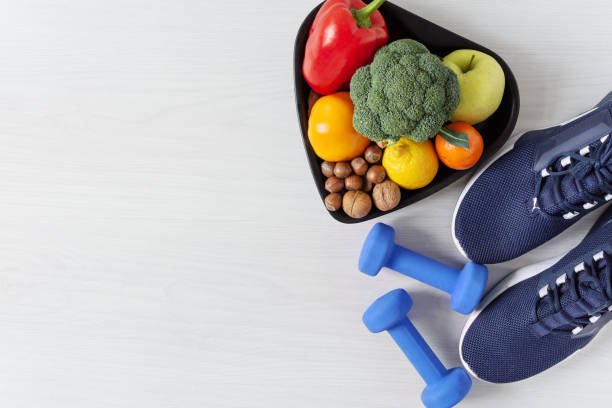
But first, let’s understand the two kinds of “age” we’re dealing with here: chronological age and biological age.
Chronological age is what we usually think of when we talk about how old someone is. It’s basically just the number of years you’ve been alive since you were born. Simple, right?
Biological age, on the other hand, is a bit more complex. It’s all about the condition of your body’s organs and systems compared to your chronological age. Think of it as a measure of how well your body is functioning internally. And here’s the kicker: as we get older, our biological age can start to creep up faster than our chronological age, leading to all sorts of health issues and, well, just not feeling as spry as we used to.
One biggie in the biological ageing game is our cardiovascular health. You know, how well our heart and blood vessels are doing their thing. Things like arterial stiffness and elasticity, along with lung function, can give us clues about how our bodies are holding up over time.
But fear not! Science is on the case. Researchers have been focusing on ways to intervene early in the ageing process to keep chronic diseases at bay and help us live longer, healthier lives. It’s not just about adding more years to our lives, but making sure those years are full of vitality and good times.
And guess what? One of the key ways we can help turn back the biological clock is by adopting a healthy diet and engaging in regular exercise. Yep, what we eat and how much we move really can make a difference in how we age. So even if the calendar says one thing, taking care of ourselves with healthy eating habits and regular physical activity can help keep us feeling young at heart, no matter our age.
Recent years have seen a surge in research delving into the intricate relationship between our diet and the ageing process. What we eat not only fuels our bodies but also influences how we age, paving the way for two key theories: oxidative stress and the epigenetic effect of food.
Oxidative stress, akin to rusting on metal, occurs when our cells face an imbalance of free radicals and antioxidants. This imbalance can accelerate ageing and invite a host of age-related ailments. Lifestyle factors such as smoking, excessive alcohol consumption, and sedentary habits can tip this balance towards oxidative stress, hastening premature ageing. On the flip side, a diet rich in antioxidants can help neutralize these free radicals, acting as a shield against the ravages of time.
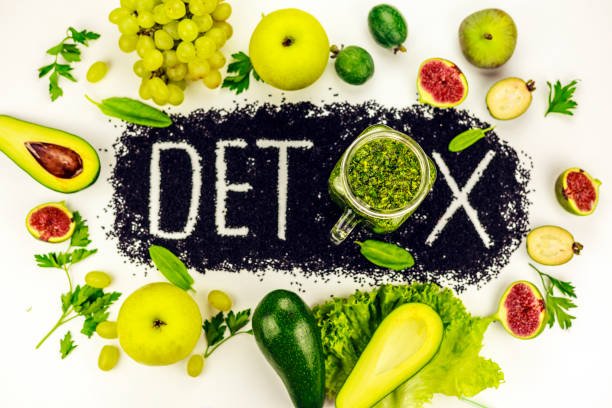
Enter epigenetics, the study of how our environment influences gene expression. Our diet, a significant component of our environment, can leave lasting marks on our genes, affecting how they function. Picture it as a switch that can turn genes on or off based on what we eat. This phenomenon not only influences our own ageing process but can also impact future generations.
Research shows that dietary interventions, especially during critical periods like adolescence, can shape our ageing trajectory. Malnutrition during these formative years can trigger metabolic and endocrine changes as our bodies scramble to conserve energy. While vital organs like the brain receive preferential treatment, others suffer, laying the groundwork for diseases like metabolic syndrome and type 2 diabetes down the road.
But it’s not all doom and gloom. Our diet and lifestyle choices hold immense power in steering the course of ageing. Regular exercise and a balanced diet laden with antioxidants can ward off oxidative stress, slowing down cellular ageing and reducing the risk of chronic diseases like cancer, cardiovascular ailments, and diabetes.
In essence, what we put on our plates today influences not just how we age but also the legacy we leave for future generations. By making mindful choices and nurturing our bodies, we can unlock the secrets to ageing gracefully and healthily. So, let’s toast to a vibrant life, one nourishing meal at a time.
The ABCs of Essential Vitamins for a Healthy You
Have you ever wondered what role your diet plays in how long you live? Well, it turns out that what you eat can have a significant impact on your longevity. Let’s dive into the key dietary components and how they contribute to a longer, healthier life.
Vitamin C: The Antioxidant Hero
We all know about vitamin C, the nutrient found in citrus fruits like oranges and lemons. But did you know it’s more than just a vitamin? It’s a powerful antioxidant that our bodies can’t produce on their own, so we rely on our diet to get enough of it. Vitamin C works its magic by protecting our cells from damage caused by harmful molecules called “free radicals.” These radicals can wreak havoc on our bodies, leading to diseases like cancer and heart disease. But vitamin C swoops in to save the day, binding to these free radicals and neutralizing their harmful effects. Not only does it keep us healthy on the inside, but it also helps our skin stay elastic and youthful by promoting the production of collagen. To ensure you’re getting enough vitamin C, load up on fruits and veggies like strawberries, red peppers, kiwis and leafy greens. Aim for around 200 mg a day for optimal health, but bump it up to 1000 mg if you’re feeling under the weather or fighting off a cold.
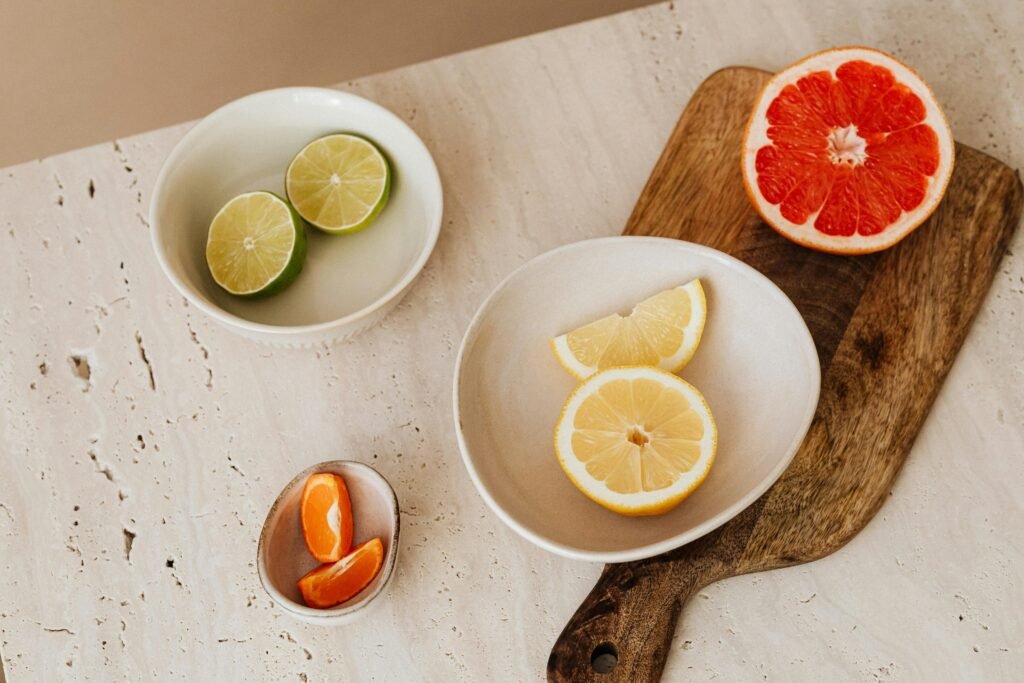
Polyphenols: Nature’s Defense
Polyphenols may not be as well-known as vitamin C, but they’re just as important when it comes to longevity. These powerful compounds act as antioxidants, protecting our cells from oxidative damage and keeping our bodies in tip-top shape. You can find polyphenols in a variety of plant-based foods, including fruits, vegetables, dark chocolate, and tea. One of the most exciting things about polyphenols is their potential to prevent diseases like type 2 diabetes and cancer. Studies have shown that certain polyphenols, like resveratrol found in red grapes, can even reverse harmful changes in cancer cells. Quercetin, another superstar polyphenol, is found in foods like onions and berries and has been studied for its anti-inflammatory and anticancer properties. By including polyphenol-rich foods in your diet, you can help combat free radicals, slow down the ageing process, and promote overall wellness.
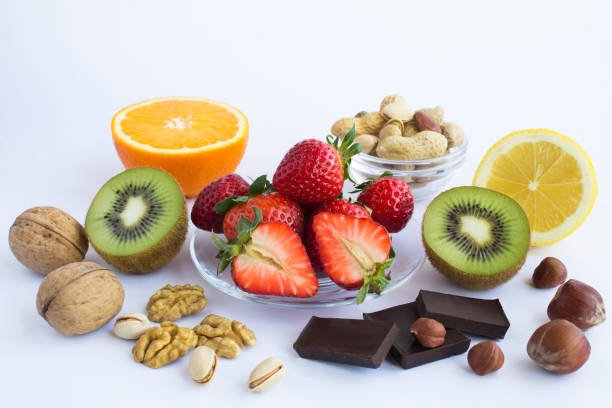
Vitamin E: The Defender
Meet Vitamin E, your body’s shield against the damaging effects of oxidative stress. Found in foods like almonds, avocado, oats and broccoli, Vitamin E fights off harmful “free radicals” that can lead to ageing-related diseases such as atherosclerosis and Alzheimer’s. By strengthening your immune system and protecting your cells from DNA damage, Vitamin E keeps you feeling your best. Shoot for a daily dose of 15 mg, which you can easily get from a handful of almonds or a serving of sunflower seeds.
Vitamin A: The Youth Booster
Vitamin A is your secret weapon for maintaining youthful, glowing skin and a robust immune system. Found in colorful foods like carrots, sweet potatoes, and spinach, Vitamin A promotes collagen production, keeping your skin tight and radiant. It also bolsters your immune system, helping you fight off illnesses and stay healthy. Make sure to include sources of healthy fats in your diet, as Vitamin A is fat-soluble and absorption is enhanced with a diet rich in fats. Aim for 700 mcg daily if you’re a woman and 900 mcg if you’re a man to experience the benefits of this powerhouse vitamin.
Folic Acid: The DNA Protector
Ever heard of folic acid and carotenoids? These might not be buzzwords you hear every day, but they’re superheroes when it comes to keeping you healthy and vibrant.
Folic acid (vitamin B9) might sound fancy, but it’s simply a nutrient your body needs for essential tasks like DNA synthesis and repair. Since our bodies can’t produce it on their own, we rely on our diet to get enough. This mighty nutrient does wonders for our health, from protecting our vision as we age to preventing birth defects and even hypertension. You can find folic acid in green leafy veggies like spinach, asparagus, and beans, as well as in bananas, eggs, and citrus fruits. Aim for about 400 mcg a day to keep your body running smoothly. Interesting fact: zinc deficiency can hamper the absorption of folic acid, so make sure you’re getting enough of both!
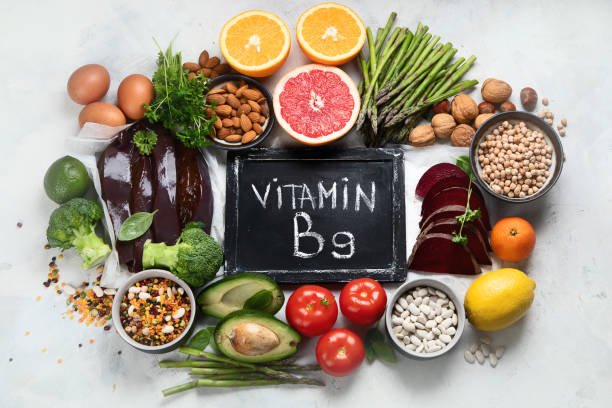
Carotenoids: Nature’s Antioxidants
Carotenoids may not roll off the tongue, but they’re the colourful compounds found in fruits and veggies that pack a punch against ageing and disease. Think carrots, red peppers, and spinach – those vibrant hues are a sign of the powerful antioxidants within. Beta-carotene, one of the star players, not only protects your skin from the sun but also supports eye health and may even help ward off cancer. Lutein and zeaxanthin, found in leafy greens like broccoli and peas, are heroes for your eyes and brain, shielding them from damage caused by UVB rays. There’s no set daily intake recommendation yet, but adding more colourful veggies to your plate is always a good idea. Whether you’re blending greens into smoothies or savouring roasted veggies, your body will thank you for the extra dose of carotenoids. The Mediterranean diet also includes many foods rich in carotenoids.
Vitamin B12: The Vitality Vitamin
Vitamin B12 may be small, but it packs a punch when it comes to keeping our bodies running smoothly. This water-soluble vitamin plays a crucial role in DNA production, red blood cell formation, and maintaining a healthy nervous system and brain function. Plus, it’s a secret weapon for protecting against cognitive decline and keeping our hearts healthy. Despite needing just a tiny daily dose of 2.4 μg, it’s essential for our overall well-being. Luckily, we can find it in a variety of animal-derived foods like beef, chicken, eggs, and seafood. So, next time you’re enjoying a serving of salmon or savouring a yogurt parfait, know that you’re giving your body a boost of Vitamin B12 goodness.
Selenium: The Age-Defying Element
Selenium might not be as well-known as other nutrients, but it’s equally important for our health and longevity. As an essential trace element, selenium acts as a powerful antioxidant, supporting our immune system and aiding in DNA synthesis. Not only does it protect against age-related diseases like tumours and cardiovascular issues, but recent studies even link higher selenium levels with a longer life. With a recommended daily intake of 55 μg, you can get your dose from a variety of sources including seafood, eggs, chicken, and nuts. So, whether you’re munching on sunflower seeds or enjoying a seafood feast, you’re giving your body the selenium it needs to thrive.
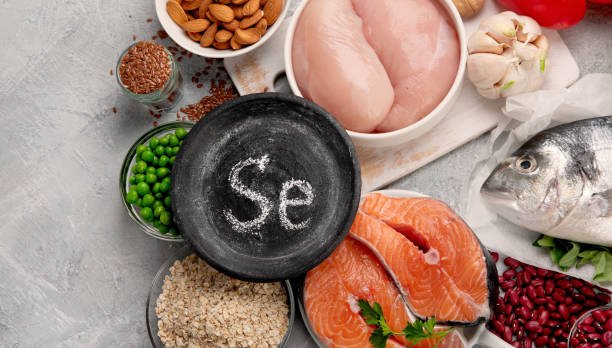
Unveiling the Secrets of Longevity: What the Long-Lived Eat
Ever wondered what the key to a long and healthy life is? Well, it might be as simple as what’s on your plate. Let’s take a closer look at two essential nutrients and explore the dietary habits of the world’s longest-living populations.
Places like the Nicoya Peninsula in Costa Rica or the Okinawa islands in Japan, often referred to as “longevity blue zones.” While there’s no one-size-fits-all diet for longevity, researchers have noticed some common dietary patterns among these populations. From energy restriction to largely vegetarian diets with moderate amounts of meat and seafood, it seems that a balanced approach to eating, coupled with regular physical activity and mental well-being, might hold the key to a longer, healthier life.
So, as you plan your meals and nourish your body, remember that the secret to longevity might just be on your plate. Whether it’s savouring a colourful salad or enjoying a hearty seafood dish, every bite brings you one step closer to a life filled with vitality and well-being.
The Power of Physical Activity
Do you ever wonder what the key to a longer, healthier life might be? Well, recent research has some compelling answers, and it might not be as complicated as you think. It turns out that something as simple as getting up and moving could significantly impact how long you live and how well you age.

Let’s break it down. Numerous studies have shown that leading a sedentary lifestyle—basically, sitting around too much—and neglecting physical activity can lead to a host of age-related health issues, particularly concerning our hearts. But fear not! There’s good news too. Engaging in regular physical activity, even if it’s just something as straightforward as a daily walk for 30 minutes, can make a world of difference.
What’s fascinating is that the intensity of your exercise matters less than you might think. Moderate activities like walking have been linked to increased longevity. Imagine that—just by taking a brisk stroll each day, you could potentially add years to your life! And here’s a fun fact: the benefits of exercise seem to stack up. For every additional minute you spend moving your body, studies suggest your risk of mortality drops by a whopping 7.9%. That’s a pretty significant incentive to lace up those sneakers and hit the pavement!
Now, let’s talk about the world we live in. It’s no secret that our modern lifestyle doesn’t always prioritize health. Processed foods packed with all sorts of not-so-great stuff, a lack of physical activity, rising obesity rates, not enough shut-eye, and stress that seems to be ever-present—sound familiar? Unfortunately, this “ageing-promoting” environment isn’t doing us any favours when it comes to living our best, longest lives.
But hey, it’s not all doom and gloom. We have the power to make positive changes, starting today. By embracing a healthy, balanced lifestyle that includes both nutritious eating habits and regular physical activity, we can flip the script on ageing. Think of it as investing in your future self—a future filled with vitality, energy, and hopefully, many more years to enjoy all that life has to offer.
So, let’s lace up those sneakers, grab some veggies, and toast to a long, vibrant life ahead!
“Tell me what you eat, and I’ll tell you how long you’ll live…”
For more information and personalised advice about anti-ageing nutrition, feel free to contact me or consult with your dietician.
Indicative bibliography
World Health Organisation, Healthy ageing. https://www.who.int/news-room/fact-sheets/detail/ageing-and-health
Campisi J. et. al., (2019). From discoveries in ageing research to therapeutics for healthy ageing. Nature. Jul:571(7764):183-192.
Giacomello E, Toniolo L., (2021). Nutrition, Diet and Healthy Aging. Nutrients. 2021 Dec 31;14(1):190.
Yamamoto et. al., (2022). Tissue-specific impacts of aging and genetics on gene expression patterns in humans. Nature Communications 13:5803.
Poulain M., (2021). Specific features of the oldest old from the Longevity Blue Zones in Ikaria and Sardinia. Mech Ageing Dev.198:111543.

